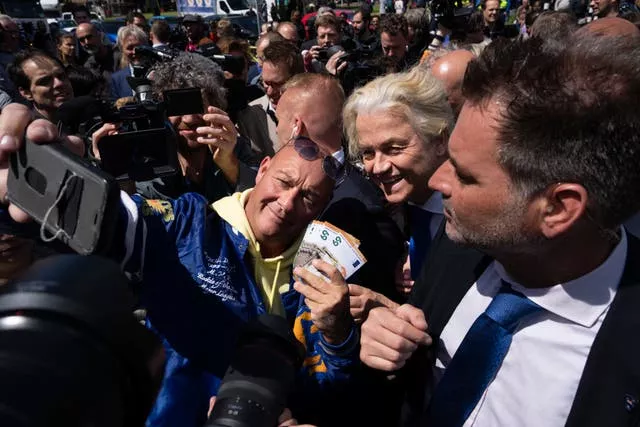Tens of millions of people across the European Union are voting in parliamentary elections in a massive exercise of democracy that is expected to shift the bloc to the right and redirect its future.
The war in Ukraine, migration and the impact of climate policy on farmers are some of the issues weighing on voters’ minds as they cast ballots to elect 720 members of the European Parliament.
Surveys suggest mainstream and pro-European parties will retain their majority in Parliament, but they will lose seats to hard-right parties like those led by Italian premier Giorgia Meloni, Hungarian leader Viktor Orban, Geert Wilders in the Netherlands, and Marine Le Pen in France.
That would make it harder for Europe to pass legislation and could at times paralyse decision-making in the world’s biggest trading bloc.
Official results of the elections, which are held every five years and began in the Netherlands on Thursday, cannot be published before the last polling station in the 27 nations close – those in Italy at 11pm local time.
EU politicians have a say in issues from financial rules to climate and agriculture policy. They approve the EU budget, which bankrolls priorities including infrastructure projects, farm subsidies and aid delivered to Ukraine. They also hold a veto over the appointment of the powerful EU commission.
The elections come at a testing time for voter confidence in a bloc of some 450 million people.
Over the last five years, the EU has been shaken by the coronavirus pandemic, an economic slump and an energy crisis fuelled by the biggest land conflict in Europe since the Second World War.
But political campaigning often focuses on issues of concern in individual countries rather than on broader European interests.
An unofficial exit poll on Thursday suggested Mr Wilders’s anti-migrant hard-right party should make important gains in the Netherlands, even though a coalition of pro-European parties has probably pushed it into second place.

Casting his vote in the Flanders region, Belgian Prime Minister Alexander De Croo, whose country holds the EU’s rotating presidency until the end of the month, warned that Europe is “at a crossroads” and “more under pressure than ever”.
Since the last EU election in 2019, populist or far-right parties now lead governments in three nations – Hungary, Slovakia and Italy – and are part of the ruling coalition in others,
including Sweden, Finland and, soon, the Netherlands. Polls give the populists an advantage in France, Belgium, Austria and Italy.
Hungarian Prime Minister Mr Orban, who leads a stridently nationalist and anti-migrant government, told reporters after casting his ballot on Sunday: “Right is good. To go right is always good. Go right.”
After the election comes a period of horse-trading, as political parties reconsider their places in the continent-wide political alliances that run the European legislature.
The biggest political group – the centre-right European People’s Party (EPP) – has moved right during the present elections on issues like security, climate and migration.

Among the most watched questions is whether the Brothers of Italy – the governing party of populist Ms Meloni, which has neo-fascist roots – stays in the more hard-line European Conservatives and Reformists (ECR) group or becomes part of a new hard-right group that could form in the wake of the elections. Ms Meloni also has the option to work with the EPP.
A more worrying scenario for pro-European parties would be if the ECR joins forces with Ms Le Pen’s Identity and Democracy to consolidate hard-right influence.
The second biggest group – the centre-left Socialists and Democrats – and the Greens refuse to align themselves with the ECR.
Questions also remain over what group Mr Orban’s ruling Fidesz party might join. It was previously part of the EPP but was forced out in 2021 due to conflicts over its interests and values.
The far-right Alternative for Germany was kicked out of the Identity and Democracy group following a string of scandals surrounding its two lead candidates for the European Parliament.
The election also ushers in a period of uncertainty as leaders are chosen at the helm of the European institutions. While the new MEPs are jostling over places in alliances, governments will be competing to secure top EU jobs for their national officials.
Chief among them is the presidency of the powerful executive branch, the European Commission, which proposes laws and watches to ensure they are respected. The commission also controls the EU’s purse strings, manages trade and is Europe’s competition watchdog.
Other plum posts are those of European Council president, who chairs summits of presidents and prime ministers, and EU foreign policy chief, the bloc’s top diplomat.
Signup bonus from




